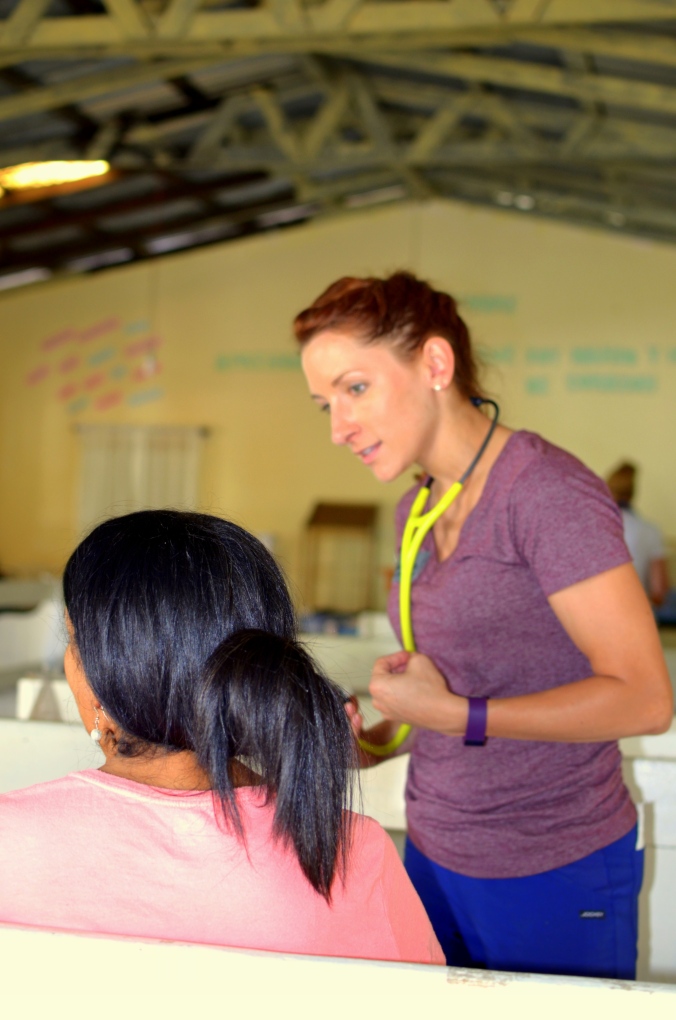Today was our hospital visit day. All students and some volunteers loaded up in a bus and traveled one hour to the Ricardo Limardo public hospital in Puerto Plata. We were greeted by the Director of Nurses who happens to be Ramon’s mother (he is one of our interpreters). It was an eye-opening experience to find ourselves in a world so foreign to ours. Here in the DR this hospital has been undergoing “reconstruction” that is very behind schedule. To us, it was a world of noise, many many people all over the place, narrow hallways, ten patients to a room, some patients lying on bare mattresses without sheets, walls in need of painting, a noticeable absence of hand sanitizer, hard back paper charts med carts for a quarter of a century ago, and last, but not least a separate unit just for those with Dengue fever.
Our American view of orderly processes and systems, air conditioning, patient privacy, private rooms, electronic health records, omni-cells and Pyxis systems were nowhere to be found. Yet the nurses and interns we met were knowledgeable and caring, warm and genuine. Florence Nightingale would have been impressed with the fresh air environment and that so many patients could be cared for under these circumstances.
We left there truly humbled and will be reflecting on social injustices throughout the world including those within our own country, for a long time. Perhaps some of us will be called to action but all of us will be incorporating this experience into our persona as American nurses and doctors.
 The day started like every other one here: rising just before daybreak and bustling around with the busy-ness of prepping for today’s clinics. By 7.40 AM breakfast was history and the first wave of trucks was loaded and ready to go. Sixteen of us set out for La Batata, where we were seeing patients coming from the local community and down from the neighboring community of El Brizon.
The day started like every other one here: rising just before daybreak and bustling around with the busy-ness of prepping for today’s clinics. By 7.40 AM breakfast was history and the first wave of trucks was loaded and ready to go. Sixteen of us set out for La Batata, where we were seeing patients coming from the local community and down from the neighboring community of El Brizon.
 This was the day of home visits in the village of Rincones. We had expected a number of additional patients that we would be asked to see, however we were also caught off-guard by a long and difficult hike to reach them. Nonetheless, considering how challenging it was for us to traverse the muddy, rocky terrain, we could only imagine how difficult it must be for those living in these most remote areas. In particular, we were seeing very elderly clients with increasing medical needs as they aged.
This was the day of home visits in the village of Rincones. We had expected a number of additional patients that we would be asked to see, however we were also caught off-guard by a long and difficult hike to reach them. Nonetheless, considering how challenging it was for us to traverse the muddy, rocky terrain, we could only imagine how difficult it must be for those living in these most remote areas. In particular, we were seeing very elderly clients with increasing medical needs as they aged.
 The following is a contribution from Donna Davis- Rankin, a registered nurse who is volunteering with us.
The following is a contribution from Donna Davis- Rankin, a registered nurse who is volunteering with us. The following is a blog post by Susan Clement, one of PRHDR’s volunteers, about her first day with us.
The following is a blog post by Susan Clement, one of PRHDR’s volunteers, about her first day with us. After completing our first clinics today PRHDR is heading to Tinijitas and Yaroa.
After completing our first clinics today PRHDR is heading to Tinijitas and Yaroa. Clinic day 1 with team Rolinda traveled to the small town of El Treinta. In full scrubs and my hiking sneakers, we took off down the bumpy road. It was a beautiful walk and an ample opportunity to get some great pictures of the wildlife, structures, and culture. A few of my favorites were the “coffee shop” which was a small table, two small pitchers of coffee and a couple random pastries, the butcher shop with dried entrails hanging from the ceiling, and the local “ice cream truck,” which was in fact a man carrying a bag of cones, a cooler on his head, all the while ringing a small bell.
Clinic day 1 with team Rolinda traveled to the small town of El Treinta. In full scrubs and my hiking sneakers, we took off down the bumpy road. It was a beautiful walk and an ample opportunity to get some great pictures of the wildlife, structures, and culture. A few of my favorites were the “coffee shop” which was a small table, two small pitchers of coffee and a couple random pastries, the butcher shop with dried entrails hanging from the ceiling, and the local “ice cream truck,” which was in fact a man carrying a bag of cones, a cooler on his head, all the while ringing a small bell.